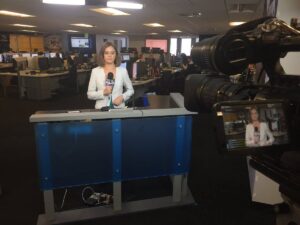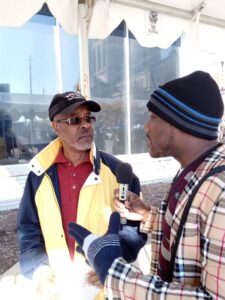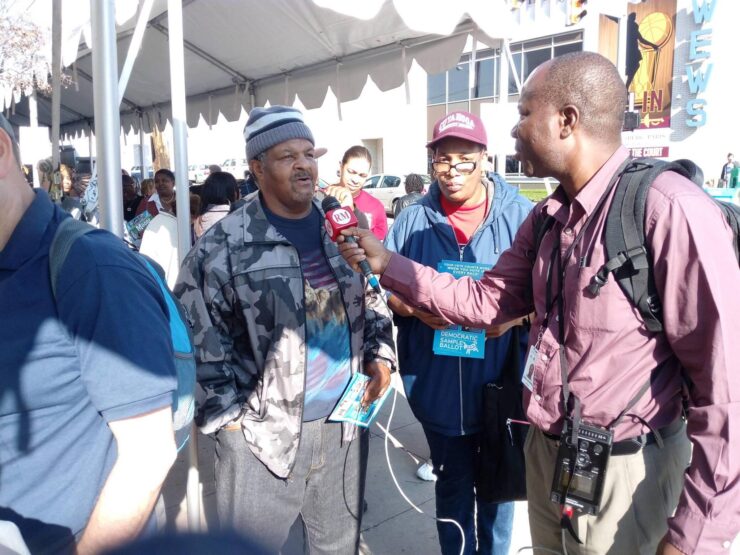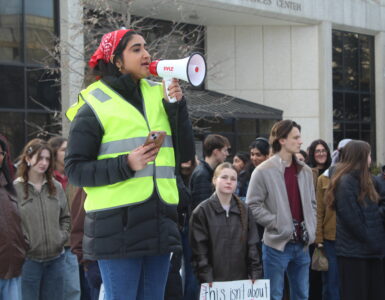As the 2024 presidential election winds down, international journalists dig into a race considered a global game-changer.
“America is a first-world country,” said Roula El Riachi, a Washington correspondent for the Kuwait News Agency, founded in 1956. “The presidential election is a matter of concern to the whole world.”
While some issues may not directly impact certain groups of viewers, the arc of American politics is still a “head-scratching ” fascination for international audiences.
Julie Asher, a Washington bureau producer at the French Télévision Française 1 news station, has had to shift coverage of the election from daily updates to in-depth pieces.
Compared to previous elections, Asher said TF1’s audience does not have “a great appetite for political stories.
“Our stories are offering more context to issues that are important or weighing on the minds of American voters as they head to the polls,” she said. “Instead of doing the horse race every day… we focus on the big issues,” such as unusual issues like redistricting in Idaho.

Beyond Washington and global borders
For election night, TF1 will have three teams of reporters from Paris traveling to different battleground states for coverage. Similar to other U.S. networks, the station plans to update all night, choosing perspectives carefully.
“The challenge is to explain what may seem inexplicable to a foreign audience,” Asher said. “That includes some of the big issues but also includes the possibility of a second Trump presidency. I think a lot of Europeans are scratching their heads and wondering how that can happen.”
Other networks are hyperfocusing on specific issues.
Kuwait News Agency’s El Riachi said the coverage of American policy around the Israel-Hamas conflict has become a priority for the news service.
“Other issues, such as LGBTQ+ rights or abortion, that are taking so much attention in the United States are not important to our viewers,” El Riachi said. “Middle Eastern viewers have more existential issues now more than ever. The conflict situation is pressing.”
In general, the news service covers U.S. news broadly, regardless of its direct impact on viewers in the Middle East. For example, the Kuwait News Agency covered Hurricane Helene and Milton directly.
For the 2024 presidential election, El Riachi and her team have covered topics such as Arab and Muslim voters and Black and Latino voters.
“You can look at them as matters of concern to the Middle East, but you can also look at them as matters of interest to U.S. leaders,” El Riachi said. “What differs sometimes, in our coverage, is the angle.”
Ripple effects worldwide
Kristen Talman, an editor at Al-Monitor, is covering an American election for the first time. Based in Washington, D.C., the news website provides analytical reports from and about the Middle East.
Talman said much of Al-Monitor’s coverage has focused on policies on the Israel-Hamas war. In addition to covering the individual candidates, Talman and other staff have focused on cities all over the country voicing concerns about the war.
News coverage has explored both candidates’ potential policies with the Middle East, their interactions with swing state voters regarding the conflict and how Arab American voters view both Harris and Trump.
“America is one of the most powerful countries in the world, and many of its citizens are passionate about what’s going on,” Talman said. She said whichever candidate wins will instantly have “a ripple effect” on the site’s Middle Eastern audience.
International organizations prepare global journalists for coverage through training and field reporting.
“Many journalists don’t have a positive image on U.S. elections with all the things that happened in the past election,” said Juan Zuniga, program director at the International Center for Journalists.
Zuniga facilitates the U.S. elections program for the center, a nonprofit newsroom that trains international journalists. The program is bringing in journalists from Algeria, Zimbabwe, and Ireland to discuss how to cover the upcoming election.

Industry professionals will talk to them about fact-checking, combating misinformation and on-the-ground reporting skills. These journalists will then be placed in newsrooms across the country to help with coverage surrounding the night.
“Many journalists don’t have free elections like we have in the United States,” Zuniga said. “Being able to help them learn about our election system, these journalists are going to transfer that knowledge they gain.”
Zuniga said the center’s training is essential for the upcoming election, as domestic journalists continue to struggle with disinformation and the use of AI-created materials.
As journalists prepare for the unprecedented cycle, Zuniga said it is important for all journalists to be cautious of what the results could entail.
“The work journalists do, putting their lives at risk, just to keep us informed is very important,” he said. “…We have a lot of polarization in this country, nowadays, and I would recommend [journalists] to be safe while doing the work.”















Add comment